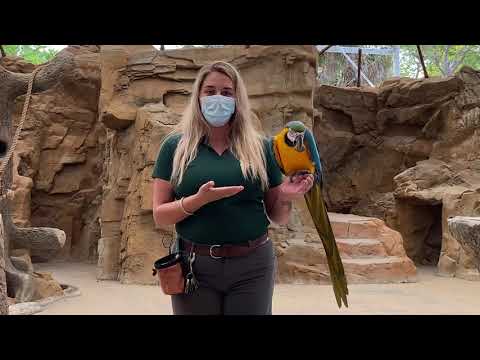Summary:
– World Parrot Day is a celebration of these colorful and intelligent birds that inhabit every continent except Antarctica.
– There are over 415 different types of parrots in the world, but unfortunately, 45% of them are listed as Near Threatened or higher on the IUCN Red List.
– The main threats to parrots are habitat loss and poaching for their colorful feathers or the pet trade.
– Supporting sustainable palm oil production is one way to combat habitat loss.
– If you’re considering getting a parrot as a pet, it’s important to ensure that it was not taken from the wild and to learn about its source and history.
Happy #WorldParrotDay: Celebrating the Colorful and Intelligent Birds!
If you’ve ever encountered a parrot, you probably understand why they capture the hearts of so many people worldwide. These magnificent creatures, with their vibrant plumage and incredible mimicry abilities, have the power to leave us in awe. Today, on World Parrot Day, let’s dive into the fascinating world of parrots and explore the unique aspects that make them exceptional.
1. The Colorful World of Parrots
Parrots are renowned for their striking colors, which vary greatly across different species. From the vivid blues and greens of the Blue-and-Yellow Macaw to the fiery reds and oranges of the Scarlet Macaw, their vibrant plumage sparks a sense of wonder in all who witness it. With over 415 different types of parrots in the world, you can imagine the kaleidoscope of colors that these birds bring to our planet.
2. Parrots Around the Globe
While some may mistakenly associate parrots solely with tropical rainforests, these birds are incredibly versatile and can be found on every continent except Antarctica. Parrots have successfully adapted to various habitats, from the lush Amazon rainforest to the arid savannas of Australia. This adaptability showcases their resilience and resourcefulness as they discover their place in diverse ecosystems.
3. The Threats Facing Parrots
Sadly, not all is well in the world of parrots. According to the International Union for Conservation of Nature (IUCN), 45% of parrot species are listed as Near Threatened or higher on the IUCN Red List. The main culprits behind this alarming statistic are habitat loss and poaching.
Habitat loss, driven by deforestation, urbanization, and unsustainable agriculture, is a pressing issue for many species, including parrots. As their natural habitats shrink, parrots struggle to find suitable nesting sites, feeding grounds, and resources necessary for survival. This, coupled with the illegal trade of exotic pets and the demand for their colorful feathers, puts tremendous pressure on their populations.
4. Supporting Sustainable Palm Oil
As conscious citizens, we can make a difference in the lives of parrots and other wildlife. One way to combat habitat loss is by supporting sustainable palm oil production. Palm oil is a versatile ingredient found in countless household products, but its production often contributes to deforestation in tropical regions, impacting parrot populations.
By choosing products made with sustainable palm oil, certified by organizations such as the Roundtable on Sustainable Palm Oil (RSPO), we can actively contribute to preserving parrot habitats. By educating ourselves about sustainable practices and making informed choices, we become eco-warriors working to secure a brighter future for parrots and the natural world they call home.
5. Responsible Pet Ownership
Many people are captivated by having a parrot as a companion. However, it’s crucial to approach pet ownership responsibly to ensure the well-being of the parrot and the species. When considering getting a parrot as a pet, ensuring it wasn’t taken from the wild is essential. Look for reputable breeders or consider adopting from rescue organizations that specialize in parrots.
Additionally, learning about the source and history of the parrot is crucial. Understanding where the parrot came from and its previous circumstances allows us to make informed decisions and provide the best possible care for our feathery friends. Responsible pet ownership plays a significant role in reducing the demand for wild-caught parrots and mitigating the negative effects of the pet trade on their populations.
Conclusion
On this World Parrot Day, let’s celebrate these magnificent and intelligent birds while raising awareness about their challenges. By supporting sustainable practices, combating habitat loss, and promoting responsible pet ownership, we can protect parrots and their habitats for future generations. Remember, every action counts, and together, we can make a difference in preserving the colorful and enchanting world of parrots.
So, grab a puzzle toy for your parrot, create some colorful artwork, or take a moment to appreciate the beauty of these captivating birds. Happy #WorldParrotDay to all the parrots and dedicated individuals working tirelessly to protect them! Let’s ensure a future where their vibrant presence continues to grace our skies and our lives. #napleszoo.
*****
Source Description
Happy #WorldParrotDay! Did you know there are over 415 different types of parrots in the world? Parrots live on every continent except Antarctica.
Unfortunately, 45% of parrot species are listed as Near Threatened or higher on the IUCN Red List. Threats include habitat loss and poaching for their colorful feathers or the pet trade.
You can take action to combat habitat loss by only buying products made with sustainable palm oil. Learn more: https://www.napleszoo.org/palmoil
If you want a parrot as a pet, check for the source and history of the parrot to make sure it wasn’t taken from the wild.
#napleszoo

